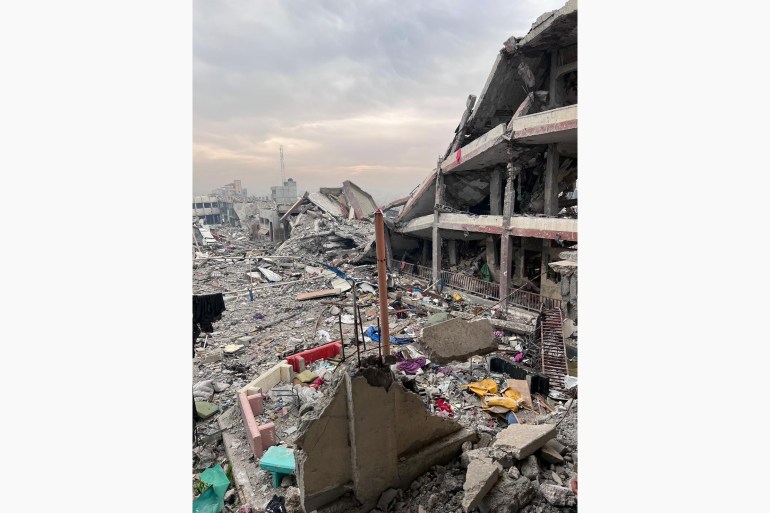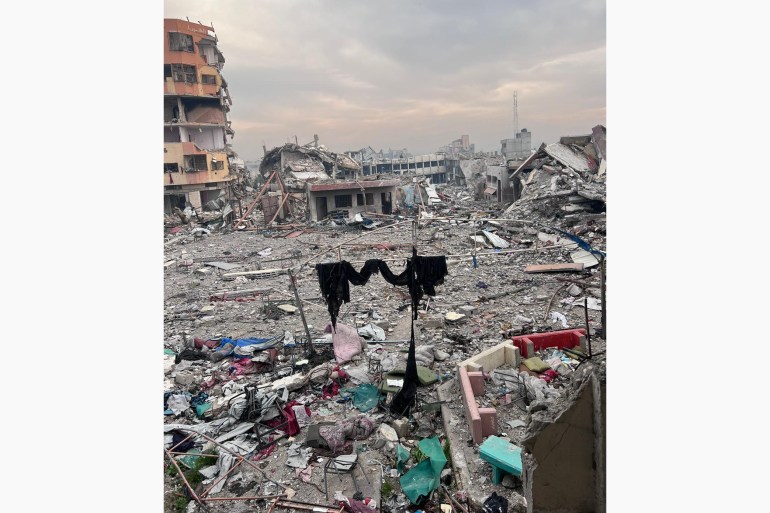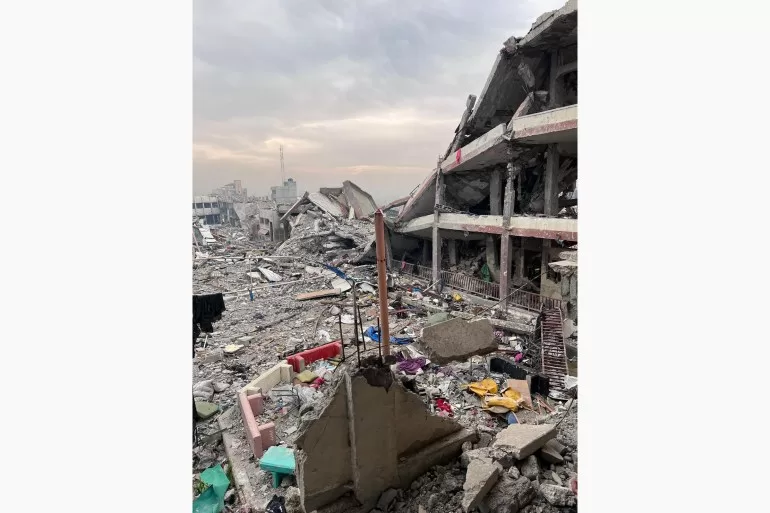Although the bombardments have not stopped, Murtaja thought returning to their home might bring him and his family some comfort, finally breaking the cycle of endless temporary evacuations.
But when he arrived where his home had been, his hopes were swiftly dashed. His three-storey house was nowhere to be seen. In its place were only piles of dirt and blackened rubble.
“We had heard that our area was subjected to heavy fire from Israeli artillery and air attacks during the ground assault,” Murtaja told Al Jazeera.
“We certainly expected to see some destruction,” he said. “But we didn’t imagine that the house would be completely destroyed and that we would have to search through the dirt for our belongings to identify where it had been. We couldn’t even find any trace of walls or a roof.”
The family of five now live in a cloth tent erected on the rubble of what was their home.
According to Murtaja, there is now nothing that impedes his view from the tent for kilometres around. Everything has been flattened.

The tent provides some shelter from the rain, but no protection from the fighting, no privacy, or enough cover to keep them warm at night.
Murtaja’s nine-year-old daughter Salma described the terror of fleeing approaching Israeli tanks. She had dreamt of going home and finding some peace from the crowded shelter in Gaza’s south. Ultimately, she found herself sleeping on the ground in a small, 6 square-metre (65 square-foot) tent, where she thinks her room may once have stood.
“I can’t even sleep. It’s like sleeping on the street but with pain and tears all day long,” she said, “All I want is my room, my dolls, and my clothes back.”
For the family, the journey back to their house was “long and traumatic”, Salma’s mother, Rahaf, said. Now, with the loss of their home, Rahaf feels none of them will ever know security again.
“For us, losing the family home felt like losing our soul while still alive. And that’s the most painful feeling a human can experience,” she said.
Murtaja, who was a driving instructor before the war, told Al Jazeera that when they first left home he thought they would only be gone a few days.
He never thought they would return to rubble.
Now, the Murtaja family must split up every morning – some search for wood to burn while others comb the area for water.
Most days, their efforts yield nothing and they return to the tent empty-handed, meaning no water or food for the day.
For families like the Murtajas, living on the remains of their flattened properties in the north of Gaza, the nights are not only cold but also terrifying.
Nearby explosions shake the ground they lie on, while stray dogs bark and yelp outside, adding to the family’s terror.
As the war enters its fifth month, thousands of Palestinian families across the Gaza Strip have lost their homes and become displaced, refugees in their own lands.
In the north, entire families have been scattered by the war, shattering the community demographically and geographically.
Murtaja feels his sense of belonging to the world has been severed.
They need aid.
More than that, he says, they need their basic humanity to be acknowledged.

“We need to feel like equal people who can enjoy the basics of their human rights, like safety, dignity, freedom, and justice,” he said.
Murtaja would love to be able to rebuild his house, and he has some hope that the international community may one day respond to the plight of the people of Gaza. But, he says, this next time he prays that the reconstruction comes with a guarantee – that when he rebuilds his house, it will not be destroyed in the blink of an eye while the world sits silent.
“I had started to feel hopeful about a possible ceasefire taking effect soon,” Murtaja says, adding, “but after I lost my house, the house that I spent ages building and maintaining, I lost hope. And I don’t think I need it any more.”
Murtaja now believes that any ceasefire would be too little, too late for his family whose sense of security has forever been destroyed.
“I don’t think it would make much of a difference to us if they announced a ceasefire now, unfortunately,” he says. “We lost hope. We lost everything.”
